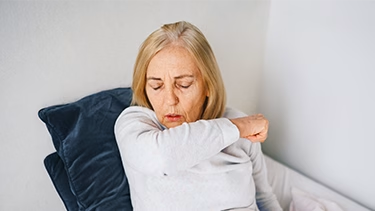Frequently Asked Questions About Dextromethorphan
What is Vicks doing to ensure the safe use of OTC medications?
The health and well-being of our consumers is our number one priority, and we strive to provide the most up-to-date information about the safe use of our OTC products. In addition, we have placed a logo on the product packaging of our products that contain DXM. Vicks wants their products to be used only as directed, for the intended purpose. That's why they've teamed up with the Consumer Healthcare Products Association. Visit StopMedicineAbuse.org to get the resources you need to make informed and educated decisions.
Should I be worried about my teen abusing over-the-counter products that contain dextromethorphan?
Dextromethorphan abuse is found primarily among teens. According to research conducted by the Partnership for a Drug-Free America™, five percent of teens have intentionally abused cough medication to get high. This form of abuse involves taking extreme amounts of cough medicine to get high. It is not possible to accidentally abuse dextromethorphan; it takes vast amounts that are far beyond the recommended dosage. Abuse of DXM can cause serious adverse events, such as blurred vision, seizure, loss of consciousness, and irregular heartbeat. Recently, the Drug Enforcement Administration (DEA) has become concerned about the abuse of this drug. The agency is working with other health and law enforcement authorities to address this serious issue and warn the public of potential harm1.
What is dextromethorphan?
Dextromethorphan is an effective, non-narcotic, non-addictive cough suppressant that works by raising the coughing threshold in the brain. It is a safe and effective active ingredient found in more than 100 over-the-counter cough and cold products. First approved by the U.S. Food and Drug Administration (FDA) in the 1950s, it is the most widely used cough suppressant in the United States2.
Is dextromethorphan safe?
Dextromethorphan is safe when used according to the medicine label directions. Cough medicine containing dextromethorphan produces few side effects and has a long history of both safety and effectiveness. These medicines are used safely by millions of Americans each year to relieve coughs due to the common cold or flu3.
Is dextromethorphan addictive?
Dextromethorphan is not addictive. Clinical trials confirm that dextromethorphan does not produce physical addiction, lose effectiveness through increased tolerance, or cause withdrawal, even in high experimental doses. While the ingredient itself is not physically addictive, teens engaged in this sort of substance abuse behavior may develop a pattern of habitual DXM use4.
What should parents know about dextromethorphan and abuse?
Dextromethorphan abuse is preventable. Substance abuse experts tell us that education is the most effective way to keep kids from abusing all types of substances, including over-the-counter medicines containing dextromethorphan. To help prevent or stop teen medicine abuse, parents should:
- Educate themselves about the problem of teens looking to otherwise safe and beneficial products, such as medications, as a means to a high, and know the warning signs.
- Talk to their teens about all types of drug abuse, including cough medicine abuse.
- Safeguard their medicine cabinets and know what products they have and how many.
- Monitor their teen's Internet use.
- Seek professional help if they think their child has a substance abuse problem.
Parents also need to be aware that:
- Over-the-counter medicine—just like any medicine—is a serious substance, and should be taken only as directed.
- Dextromethorphan-containing medicines, like all medicines, should be stored in a safe, secure location.
What are some of the slang terms for dextromethorphan?
Slang terms for dextromethorphan vary by product and region. Adults should be familiar with the most common terms, which include "Dex," "DXM," "Robo," "Skittles," "Syrup," "Triple-C," and "Tussin." Terms for using dextromethorphan include “Robo-ing,” “Robo-tripping,” and “Skittling,” among others5.
What are the effects of abusing dextromethorphan?
The effects of the abuse of cough medicines containing dextromethorphan can vary with the amount taken and from person to person. Common effects include confusion, dizziness, blurred vision, slurred speech, loss of physical coordination, stomach pain, vomiting, and rapid heartbeat. Those who have abused dextromethorphan describe different “plateaus,” ranging from mild distortions of color and sound to visual hallucinations, “out of-body” dissociative sensations, and loss of motor control. The effects worsen as the dose increases.
Side effects can also be worsened when the cough medicine being abused contains other ingredients to treat more than just coughs or when it is combined with alcohol or illegal drugs6.
What are CHPA, Vicks, and other makers of OTC cough medicines doing to stop this abuse?
Vicks (Procter & Gamble) is working on a number of legislative initiatives on the federal level to complement the industry’s educational efforts to curb teen cough medicine abuse.
CHPA and the makers of OTC cough medicines are working to pass federal legislation that would restrict the sale of raw, unfinished dextromethorphan. CHPA supports legislation ensuring that only legitimate entities registered with FDA or relevant state agencies can purchase dextromethorphan in its raw, unfinished form. Currently, there are no national sales or purchase restrictions for dextromethorphan in this form. The Dextromethorphan Distribution Act (H.R. 1259) was passed by the U.S. House of Representatives on March 31, 2009. Similar legislation passed in the House in the 110th Congress. CHPA is working to see that a companion bill is introduced and passed in the Senate as well.
Additionally, CHPA supports legislative and retail efforts to implement sales restrictions prohibiting the sale of OTC cough medicine to minors. In the 110th Congress, the Dextromethorphan Abuse Reduction Act (S. 2274) was introduced to accomplish this goal. CHPA—and partners, such as the Community Anti-Drug Coalitions of America, the Food Marketing Institute, the National Association of Chain Drug Stores, and the Partnership for a Drug-Free America—are working with members of Congress to see that similar legislation is introduced and passed7.
Where can I get more information on this topic?
For more questions and answers about dextromethorphan visit the Consumer Health Products Association FAQ at http://www.chpa.org/FAQsDXM.aspx.
For more information on stopping medicine abuse, visit Stop MedicineAbuse.org
